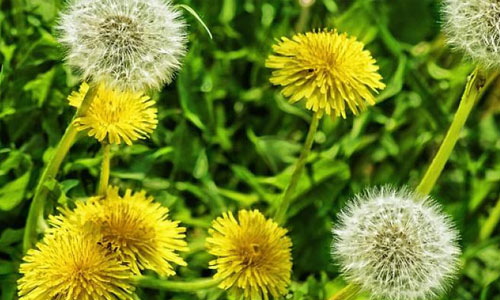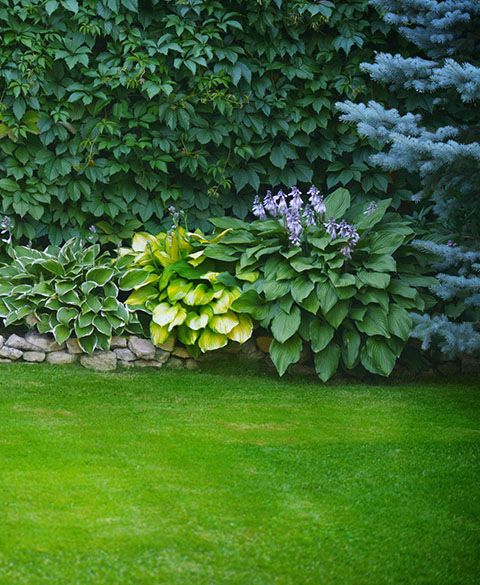How to Get Rid of Weeds

Having Trouble With Weeds? Follow These Tips
Removing weeds from your lawn is important not only for aesthetics but also for the health of your grass. Common weeds like dandelions, thistle, and crabgrass can create competition for valuable resources such as sunlight, nutrients, and water. As weeds steal these resources, your grass gets weaker, making it easier for weeds to completely overtake your property.
If you’re searching for a way to take care of weeds without using harsh chemicals and sprays, here are some tips from our weed control experts:
Identifying Common Weeds
Proper identification and treatment of each variety of weed are important to maintaining proper weed control. That’s where the experts at Blades of Green come in, our technicians are trained to identify harmful weeds and provide the correct treatment every time. The overpowering, nutrient-depleting nature of weeds in Northern Virginia and Maryland is what makes them an enemy of any lawn.
Some of the weeds we get rid of include:
Crabgrass
Crabgrass is an annual weed that germinates during spring and summer. A single crabgrass plant can produce 150,000 seeds during the growing season so it can be very difficult to control. Left untreated, crabgrass will take over an entire lawn killing off the existing turf and causing issues with erosion in the winter when it dies off. Although this pesky weed is very difficult to control once it has germinated, specialized products can be used to help eliminate it.
Nutsedge
Nutsedge is known for sticking out like a sore thumb by growing very quickly and much taller than the average grass. Nutsedge is easy to identify by their triangular-shaped blades that are often bright green. This weed is difficult to control because it is a type of grass and common weed control products may not work. It cannot be prevented with pre-emergent and has to be treated once emerged with a specialized product.
Dandelions
These little yellow weeds are very common and seem to be present in nearly every lawn in Maryland and Northern Virginia. Dandelions are perennial weeds that spread seeds prolifically. The flowers of the dandelion are bright yellow and later dry to become the familiar white balls of fluff that easily blow in the wind. A single plant can spread seeds over hundreds of yards. Pre-emergents used in late winter or early spring will prevent dandelions from emerging. The best way to eliminate dandelions is by maintaining a thick, lush lawn.
Clover
Most lawns have clover present in them. Although there are many varieties of clover, all have three round leaflets sitting on the end of a long stalk. The weeds will also have round white or pink flowers on them. The presence of this weed is a good indicator that your soil is lacking in nitrogen…since it produces its own nitrogen will thrive in lawns that are under-nourished.
Chickweed
Chickweed is a very common weed and is fairly easy to recognize…if you look very closely you will discover that there are five petals on each of the flowers. Each petal has a very deep lobe and it makes it look like the chickweed flower has ten petals. It has a very shallow root system and will pull up rather easily. This is considered a winter weed and will die on its own when temperatures warm up in the spring. Since traditional weed control products do not work as well in cold months, it is best to let this weed die on its own and will disappear after the first few mowings of the year.
Thistle
Thistle is a perennial weed that has sharp, prickly leaves (sometimes with lilac-pink flowers). This weed spreads rapidly through its aggressive root system and ability to scatter thousands of seeds during a short period of time.
Does Vinegar Kill Weeds?
Vinegar-based pesticides can be effective against weeds; however, store-bought vinegar is not powerful enough to have an effect. Horticultural vinegar pesticides contain at least 20% acetic acid, while grocery store products only have 5%.
This stronger concentration can kill weeds in as little as 24 hours, but it only eliminates above-ground growth. The root system is left unaffected, allowing weeds to grow back. Vinegar is also non-selective, meaning it will harm your grass, flower, shrubs, and trees if they are accidentally sprayed.
Does Saltwater Kill Weeds?
Saltwater does kill weeds, and it does this by traveling up through their roots and dehydrating the plant as it is absorbed. Like vinegar, salt water is also non-selective, which means it will harm all the plants it comes into contact with. To effectively use salt water as an herbicide, use a 3:1 mixture of water to salt and use a funnel to pour it directly on each weed, then water the surrounding plants to mitigate damage.
Saltwater should be used sparingly in your lawn, as salt is not biodegradable. Instead of breaking down, salt builds up in the soil and can change the pH, eventually eliminating necessary nutrients from the soil and making it impossible for anything to grow.
Consider Professional Lawn Care
End the guesswork and stress of lawn maintenance. Let our experienced team put their expertise to work making your lawn healthy and beautiful.
What Kills Weeds Permanently?
Herbicides are the best option to get rid of weeds and are safest when applied by lawn care professionals.
To kill weeds permanently, you have to eliminate every part of them—leaves, stems, and especially the roots. While brown, wilting leaves may make it seem like a weed is dead, it will still come back unless the roots are killed as well. Some DIY options can kill weeds permanently, but they can be dangerous to you and the environment if used incorrectly.
How to prevent weeds
Keeping your lawn thick and healthy will keep the weeds from overrunning your lawn, meaning that professional lawn care is the best way to prevent weeds in the first place. Although weeds can grow in any soil, soil improvements can help level the playing field between the plants you want and the weeds you don’t.
Add plants and ornamentals to your landscape
Adding ground cover plants is a great method for crowding out weeds in decorative garden beds. Essentially, weeds take advantage of open areas and available resources; eliminate these, and you’re well on your way to preventing weeds.
Ensure your grass is rich in nutrients
You can make sure that your existing plants are weed-free by keeping them healthy—aerated soil that is well-drained will ensure this happens, especially when followed up by seeding services. You can also test your soil to develop an optimal fertilization plan.
Use organic mulch for garden beds
Mulch is probably the most important factor in controlling weeds. Bark and other decorative mulches work to prevent weed growth by blocking light. Most professionals agree that organic mulches are the way to go. These types of mulch help improve soil structure and add nutrients to the soil. Mulch can also keep the soil cool and reduce water loss due to evaporation!
How to Kill Weeds Naturally
The only way to kill weeds without any products is to pull them up by hand, which can be hard work. You have to grasp the base of the plant and pull its roots out completely to ensure it will not return.
Other natural ways to kill or prevent weeds include:
Corn Gluten
It dries out the initial roots of emerging plants, killing weeds before they take over.
Mulch
Mulch prevents sunlight from reaching weed seeds, smothering them and preventing them from sprouting.
Healthy Grass
Healthy, dense grass is less susceptible to weeds that need space and sunlight to grow.
Limiting Your Digging
Dig only where you need it because soil, grass, and other plants are potentially obstructing hidden weed seeds.

Get a FREE Lawn Care Quote Now
Quick Quote Form
"*" indicates required fields
